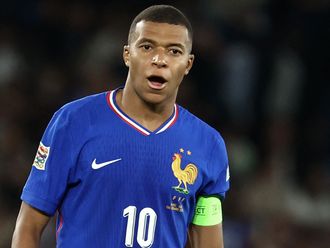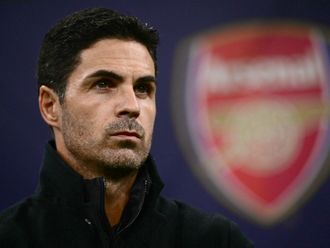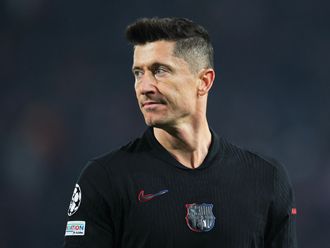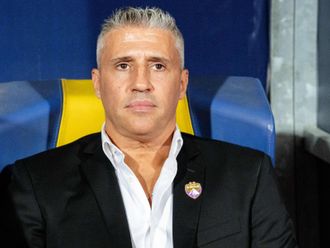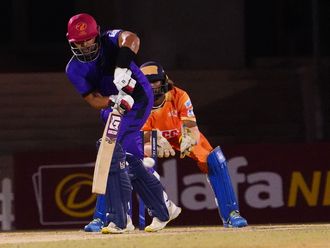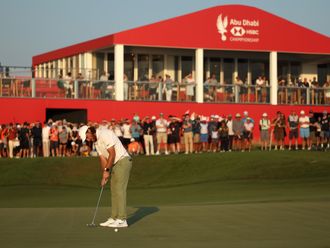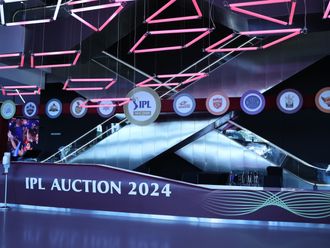As the UAE FA continues the arduous drive towards professionalism, the domestic league has seen some enormous developments on and off the pitch during the first half of the season.
The most outstanding announcement came just in time for Christmas in the form of a naming-rights sponsor.
The UAE's national telecommunications company, Etisalat, last week signed a three-year deal to sponsor the UAE Premier League and the second division league in what should be a highly profitable venture for both parties. Fifa rewarded the UAE domestic league only last year, voting it the best in Asia and Etisalat is bound to profit from this improvement long-term.
And the league, as it struggles with the enormous challenges involved in changing the league from amateur to professional, will benefit from the support of a reputable and financially stable company. On the pitch, defending champions Al Wahda, President Cup holders Al Ain, contenders like Al Jazira, Al Nasr, Al Ahli, Al Shabab and Sharjah have added serious entertainment to the league with the hiring of some outstanding professional players.
On track
Al Ain might have made the Asian Champions League final but Al Wahda are clearly on track to defend their title as they have been consistently strong and tactically versatile.
Elsewhere in the Etisalat League, talented national players have also attracted healthy crowds to the grounds despite the fact that most league matches are telecast live on TV. Players such as Tamer Mohammad, Musallam Ahmad, Amer Mubarak, Nasir Khamis, and more experienced campaigners such as Yousuf Moussa, Esmail Matter, Salim Sa'ad, Abdul Aziz Al Anbary and Saeed Al Kass have all had polished seasons.
UAE teams are only allowed to play two foreign professionals but the debate about local versus foreign players has featured again in the first half of the season.
Concerns that professional players might be harming the chances of national footballers have been challenged and largely found to be false.
The records so far prove that national strikers such as Faisal Khalil, Salim Sa'ad, Esmail Mattar and Saeed Al Kass are scoring more goals and generally benefiting from working with their professional colleagues.
Al Wahda
Defending champions Al Wahda have been winning in style and clearly deserve to be leading the league.
They have 28 points from 11 matches and have only lost one encounter, against Al Shabab, and drew another with Al Nasr.
On the for-and-against, Al Wahda have scored 33 goals and conceded 15.
They have been leading the league for 27 weeks (including last season): numbers that suggest the team is consistent and hungry to impress.
Al Wahda's line-up is varied, capable and full of danger.
Upfront, they have a lethal attacking trio that links Bosnian Metrovic and Angolan star Moritto with Esmail Matter, the UAE's most talented attacking midfielder.
Midfielders Hayder Allo Ali and Abdul Rahim Jumaa in addition to defenders Fahad Masoud and Basheer Saeed have all scored goals.
Saleh Al Minhali, meanwhile, proved to be coach Rainer Hollman's talisman scoring and setting up several goals this year.
Abdul Salam Jumaa is playing his best football as a pivot midfielder and the strength of the team's midfield covers for the weak defence.
Despite their lax defence, Abdul Basit Mohammad, the team's custodian, and the shortest goalie in the league, has conceded just 15 goals in 11 matches.
Hollman has also added a lot of tactical strength to the side with his knowledge of the other local teams because he led Al Nasr, Al Shaab and Al Shabab before joining Al Wahda.
Clearly, Al Wahda is the club to beat and look even more dangerous now that they have signed Iranian Jawad Nekounam to replace Moritto when he goes to represent Angola in the African Cup in January.
Al Jazira
Defensive and goalkeeping mistakes have denied Al Jazira a title in the last few seasons and nothing has changed so far this year.
The team starts consistently as one of the best contenders for the title but they lose easy matches because of defensive mistakes and ungainly line-ups.
Prior to leaving the club, coach Sef Vergoossen, for instance, was reluctant to use his two international wing backs Saleh Obaid on the left and Yousuf Abdul Aziz on the right.
Vergoossen instead tried to transform Mohammad Omar and Hussain Suhail, who were accustomed to playing as central midfielders, into players who could dominate the right flank.
He also tried using youngsters Musallam Ahmad and Tamer Mohammad, an experiment that badly backfired.
The good news for new coach Walter Meeuws, who has coached Belgium's national team, is that Al Jazira have all the class in attack.
Their forward line features Mohammad Salem Al Enazy and Bartholomew Ogbeche and it is one of the most capable attacking combinations in the league.
They have scored 20 goals in 11 matches with Ogbeche scoring half of them, but they have also conceded 21 goals, 11 of them in two matches against Al Wahda and Sharjah.
These performances led to termination of Vergoossen's contract and the appointment of Meeuws as a caretaker coach.
But the problem is not entirely tactical; the backline player must accept the majority of the blame.
It doesn't help that Ebrahima Diyaki, the team's midfielder, is not at his best.
Diyaki was integral in bringing the defence line together, but so far this season there have only been big spaces for their opponents to exploit.
With 19 points, Al Jazira is expected to lose their second place to Al Ain who have 18 and two matches in hand.
Sharjah
Sharjah have produced some of the best football anyone has seen from the club in years.
They have collected 18 points from 11 matches and are showing all the signs of returning to their former glory, which earned them many league and Cup titles.
Sharjah have one of the best scoring capabilities in the league represented by strikers Anderson and Saeed Al Kass, together with midfielders Abdul Aziz Al Anbary and Nawaf Mubarak.
The team has at times worked brilliantly as a unit and Henri Estamboli, their French coach, should take a lot of credit for this because his side is now a real contender.
Sharjah have created a good combination of experienced players like Tarig Musabbah, Al Anbary and Al Kass with young talent such as Nawaf and Ebrahim Saif.
The team's biggest problem is in the flanks.
A defensive pattern that included a sweeper would do a lot to cover the fast counterattacks, which many teams have used to exploit Sharjah's defence.
Al Ahli
Al Ahli is always one of the favourites to win the domestic title.
This year, they have started the season strongly, winning all three matches before settling for a tie with Emirates and a share of the league lead with Al Wahda and Sharjah.
But the team's performances then deteriorated badly as they lost their three next matches to Al Nasr, Al Wahda and Al Jazira.
Faisal Khalil is Al Ahli's most valuable player upfront while their new professional Martin Kumprov, from Bulgaria, needs more time to adapt and shine.
Kumprov scored one goal in two matches and it was from the spot in the match they won 7-1 against Bani Yas.
The team have the qualities to win consistently but they need more hard work from the technical staff, headed by their German coach, Shaefer, and greater commitment from the players.
Ahli are fourth in the league with 18 points from 10 matches, scoring 23 goals and conceded 15.
They have a postponed match against Al Ain today and if they can beat them they will be in clear second with 21 points.
Al Ain
Losing three of their first eight matches is not quite like Al Ain. The men in purple are the President's Cup holders, runners up in the Asian Champions League and the first UAE club to apply for the professional status.
The team is yet to look threatening in domestic matches this year but if they win their two postponed matches, they will increase their tally to 24 points and finish the first round in second place, four points adrift of leaders Al Wahda.
The main concern for Al Ain in their three losses was not tactical, but chiefly because the local players, who used to be among the best in the country, are not getting the job done.
Players like Subait Khater, the best player in the UAE last season, Rami Yaslam, Shihab Ahmad and others are below par mostly due to exhaustion.
Many UAE national team players, like Khater, have had club and national team obligations in domestic, continental and international competitions already this season.
The fact that the management did not sign good professionals has added to the poor results, especially in their 4-1 loss to Al Wahda.
And while Al Ain have the best two goalkeepers in the UAE - Moutaz Abdulla and Waleed Salim - Milan Macala, their head coach has to be careful when rotating them.
Selecting Waleed, for example, to play in place of Moutaz against Emirates was something team management said was a punishment, of sorts, for the Al Wahda defeat.
But Moutaz was Al Ain's best player that night, saving several goals including a penalty.
Al Nasr
Al Nasr had a strong start and deserve to be considered a dark horse for the title.
They have 17 points from 11 matches and have lost four games and these losses have come from a variety of strange tactical and individual errors.
Their German coach, Geyer, is only just hanging on to his job although their last victory against Al Shaab should help extend his contract.
Geyer must, however, find a way to get his team back to the standard they were at when the season kicked off.
His chief concern is player dissent because Al Nasr has been plagued by internal suspensions and disciplinary suspensions by the FA.
Poor performances from the team's custodians - Mohammad Gholom and Dawood - have added to the team's misfortunes.
Geyer has also complained that he does not have a good striker who can score from any angle.
But the fact that the team have scored 24 goals in 11 matches, conceding 17, is a sign the team is capable of pushing for a top spot especially with Brazilian striker Valder, the top scorer last season, still in good form up front.
Their situation would be greatly improved if Yousuf Moussa, the team's left wing back and scorer of six goals this season, were promoted back into a goal-scoring position.
He has, amazingly, been used as a fullback .
A striker to replace former AC Milan superstar Guly would be a bonus for the oldest football team in the UAE.
Guly, an Argentinean, was sacked after only the second round this year.
Al Shabab
Al Shabab has quickly become the most unpredictable team in the league.
They play their strongest matches against the top teams, only to take the weak teams for granted and go on to squander valuable points. The result is that Al Shabab is seventh with just 17 points.
Thirteen of those points have come from the top six teams while they won only one point which has come from games against the three bottom-placed teams.
They have scored 19 goals and conceded as many.
They have had some key changes to technical staff, terminating the contract of Dzmal Hajji and bringing in Brazilian Rene.
Brazilian midfielder Rodrego has also been replaced by Iranian Eman Mobali while their professional striker, Mohammad Manga, is in strife because he has scored only three goals.
UAE striker Salem Sa'ad is enjoying one of his best seasons proving he has dazzling ball control and endless energy.
Sa'ad is the team's top goal-scorer and also a strong goal-provider for his teammates.
Al Shaab
Al Shaab has been haunted by concerns over their personnel.
Two of their best players have fled the country seeking a more lucrative future as professionals.
Rashid Abdul Rahman, their international defender, and Mohammad Sorour, the international striker, have gone to Switzerland to play as professionals and that has greatly affected the team's chances this season.
Al Shaab are placed eighth with 12 points, having lost five matches and drawn three which means they squandered 21 points from 33. They could slip further down the standings if Al Wasl win their postponed match against Al Ain on January 6.
Iranian Ali Samerah and UAE's Sameer Ebrahim led the team to three wins under former German coach Willy Raymon but he was replaced at the end of the first round with Tunisian coach Yousuf Al Zawawi.
The team's Argentinian midfielder Adrian has shown great promise but he is slow and might be replaced during the second period of registering professionals, from Tuesday.
Nabeel Ebrahim, the team's midfielder, is the best player at the moment and has attracted local clubs to sign him.
Al Wasl
Al Wasl have consistently been one of the best teams in UAE football. They have won scores of local titles, but in doing so have seemingly forgotten to build for the future because they have faced relegation several times in the past five years.
Al Wasl are now ninth with 10 points from as many matches, just four points from the bottom.
Knowing that two teams will be relegated at the end of the season, the club accepted the resignation of former player Hassan Mohammad and signed Ivan, the Slovak coach.
Al Wasl must win and win big if they're going to stay in the big leagues and a good start would be against Al Ain on January 6.
Their professional strikers - Farhad Majidi from Iran and Oliviera from Brazil - are the leading lights in a group of young but inexperienced players who have shown great skill but need time to polish their talent.
Emirates Club
Avoiding relegation last season was a great achievement for the Emirates Club. Their sole aim this season is to repeat that feat and stay with the elite teams, but it won't be easy.
Coach Drajan has already been sacked while Colombian striker Elson Becerra has fled the country.
The club needs another striker to play alongside their Algerian striker Karim Karkar.
Karkar is the only player to have scored for Emirates this season and his three goals were enough to win three matches and earn the club nine points.
Abdulla Mallullah, the team's central defender, has been solid so far and is a target for Al Ain to play as a professional.
Bani Yas
Bani Yas's poor results have resulted in sweeping changes at the club.
The technical and administrative staff, as well as the board of directors, have all been dismissed.
German coach Bernb Krauss was sacked and his assistant, Peter Polack, was appointed caretaker coach following the team's 2-0 home defeat against Al Jazira.
The club management are expected to announce a Turkish coach who will take over this week.
Unfortunately, the new staff haven't improved the situation - they lost their first match against Ahli 7-1.
The team have suffered due to the absence of many good players like Esmail Rabie, his brother Harib and Mohammad Hassan while at the same time their professional players are not meeting expectations.
Dodze Kuwaji, their striker, has scored six goals but the teams' fans are still waiting for his colleague, Oscar, from Colombia to add more strength to the team as he scored only two goals in 11 matches.
Bani Yas are vulnerable across the park but are especially fragile in defence and in goal.
Fitness is also a big concern as the side collapsed in the last quarter to Al Ain and Ahli.
The team need a lot of hard work to stay in the first division.
Bani Yas are placed 11th with just eight points and need a minor miracle if they are to remain in the first division.
Dibba Al Hisn
Playing in the first division in itself is a big achievement for Dibba Al Hisn.
This is the first time the club has made the elite league in their 25-year history.
The team surprised everyone when they won five points from their first three matches and came from two goals down to win against Bani Yas and Al Shabab.
Dibba then beat Al Shaab 2-1 away and these brilliant results made many fans optimistic that their team could be the dark horse of the competition.
But then, reality hit and hit hard.
Dibba have just one point from eight matches in the first round of the league and are last on the standings with six points from 11 matches, in which they scored 15 goals and conceded 33.
Leading Goal Scorers
Nigerian Bartholomew Ogbeche, Al Jazira's striker, and Bosnian Metrovic, of Al Wahda, are the top scorers in the league at the end of the first round with 10 goals each.
UAE's Faisal Khalil of Al Ahli leads the Emirate strikers with eight goals and is placed joint second with Brazilian Valder of Al Nasr and Iranian Ali Samerah of Al Shaab.
Evergreen striker Saeed Al Kass of Sharjah is joint third with Brazilian Oliviera of Al Wasl with seven goals, followed by Abdul Aziz Al Anbary from Sharjah and his Brazilian colleague Anderson.


